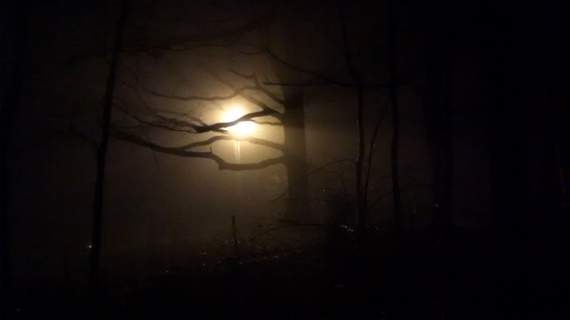On Christmas Eve I was gazing at our Christmas tree, particularly at a blue stained glass ornament nestled inside the branches deep in the tree, peering out from within. It spoke to me of the light of God hidden deep within each of us -- substantial, hard, and real -- not the gushy, sentimental, noncommittal entity we talk about sometimes and think about less. The star was there, but I had to take time to be with the tree and to look carefully to discover it.
What is it we can discover deep in creation and in ourselves, and what does it mean? Therein lies a story. One of God's own creatures, to whom God had given free will, decided to try to control creation, to grasp power onto himself in a tremendous act of self-love. Out of real love and concern about this, and out of solidarity with all of human and nonhuman creation, God made himself into a human. The divine went through the natural creative process of birth, becoming created and uncreated at once, joining Godself with the things God made. In doing so Jesus, this Son of God, gave up his omniscience and omnipotence to become finite. He gave up his infinity to become limited because he loved the works of his hands so much.
However even this self-denying act of giving wasn't enough to convince humans to live with the community of life rather than to dominate it. So God decided to love even more. The ultimate self-denying gift of himself would be to allow God's own creation to take from God the very life God had given up so much to gain -- to love God's creation even in the face of denial, ingratitude, rejection and death. This two-fold act of totally self-less love broke the hold that self-love had over creation.
The effects of that break slowly unfold to the extent we discover God's self-giving presence and allow it to change us. As we change internally, so do the mindsets that guide our choice of technologies and social organization. Our behaviors change accordingly. We seek concord and cooperation and the good of all creatures. As more and more of us choose to be transformed, ripple effects move out more and more strongly, causing all of creation to prosper. Humans increasingly will stop asking how much cost we can bear by protecting the environment because, in a sense, there will be no more cost -- all creation will prosper and reflect God's joyous presence as the result of our behavior. Our world will be transformed.
It all begins by looking deeply within. We can discover that presence within us, and then can discover it in all other things. Or, we can discover it in a tree, and then realize at the same time it's deep in us. Either way, as we grow we realize that that which is without is deep within, and that it's with us wherever we go. We also come to understand that we're not promised freedom from the broken world but companionship and guidance in moving through it, and that by working together we can make the world whole. That's good news.
About the Center for Religion and Environment

